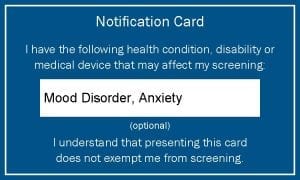Vacations are supposed to be a time for rest and relaxation in the company of those we love. So why does “vacation” appear as a stress-inducing event on the Life Change Index Scale, otherwise known as “The Stress Test?” As much as we cherish the memories of family vacations past, the actual experience of going on vacation ranks higher on the index than shopping at Walmart on Black Friday and only slightly lower than trouble with your boss. Try travelling with a child or teen with a serious mental health disorder and you are right up there with “retirement” and “pregnancy” for stress-provoking life changes.
Scientists Peter Felka and Tamas Kurimay report in the journal World Psychiatry that people with mental illness make the most vulnerable travelers. Older teens and young adults may experience their first psychiatric episode while traveling, and travel-induced psychosis can occur in travelers without schizophrenia or a previous history of psychosis. Panic attacks, phobias, OCD and anxiety are even more common among travelers young and old.
My family has had the good fortune to take some amazing vacations, including Disney World, a Caribbean cruise, the Costa Rican rain forest, and a road trip of the American West. The best memories from these trips have become a permanent part of the family lore. But let’s face it, travelling with a child or teen with serious mental health issues isn’t always easy. These 12 tips are based on my family’s experiences (and my wife’s superior organizing skills), often learned the hard way but ultimately leading to better results and more fun for everyone:
Communicate the Plan Early and Often – It’s not enough to have a great plan. Talking about the plan ahead of time is an essential part of managing expectations for all family members, not just the person with a disorder.
Splurge on Creature Comforts – You’re on vacation to relax and enjoy yourselves. In my experience, it has been worth it to spend more on such luxuries as a suite with kitchen and separate bedrooms, comfortable rental car with extras like a DVD player, and private tour guides so we’re not tied down by the pace and schedule of a group.
Use a Packing List – And don’t forget medications and any props your child relies on for comfort and relief of stress, such as a favorite stuffed animal, music player, special pillow, or white noise machine. My wife has created check-off packing lists for each member of the family to prevent such catastrophes from occurring. I would probably have a better time on vacation if I used the list she made for me, since I am always forgetting something.
Give Yourself Extra Time for Everything – A missed plane, rushing to the next activity, or a meltdown resulting from a late meal can ruin a vacation. If your plane tickets say to arrive at the airport two hours early, plan for three and hope for one. It also helps to keep scheduling of daily activities flexible. One strategy is to travel to a self-contained world like a cruise ship or all-inclusive resort, where all you have to worry about is getting there and back.
Prepare Your Hosts – If you’re visiting friends or family, prepare them for your child’s challenges and any special accommodations he may need. Nothing will spoil a vacation faster than judgmental relatives eager to load on the free parenting advice while having zero understanding of what you and your child are going through.
Balance Adventure with Familiarity – Family vacations provide great opportunities to explore new activities, foods, customs and locations. But “the new” can also be stressful, especially for a child or teen with a mental health condition. Try to balance the new with the familiar by visiting a theme park your child knows through movies and popular media, taking some meals at a familiar chain, and being tolerant of use of electronics and mobile devices.
Avoid Trigger Situations – Does your child not deal well with long lines and waits? Don’t go to Disney World. Or do what we did and go the week after Thanksgiving (slowest week of the year), stay at a resort inside the park and buy FastPasses to cut through lines.
Stick to a Routine & Don’t Overdo It – Your child or teen may be having such a good time you are tempted to let her go all day and night. Keep in mind that she may lack an internal off switch and it may be up to you the parent to set the limits. Family vacations are often derailed when the fun level is high and little routines like taking medication, getting sufficient sleep, preserving “down time” and maintaining good nutrition get dropped with disastrous results.
Download and Print a TSA Notification Card – Airport Check-ins can be one of the most stressful points in a family vacation. Did you know that you can request private TSA screening and expedited processing (i.e., go to the front of the line) for your child with mental health issues? Note the TSA policy: Travelers with Disabilities and Medical Conditions. The policy page links to a TSA Notification Card which you can download and print for presentation at TSA security points. We laminated ours and keep it clipped to our child’s passport.
Tag Team Your Kids – If you’re travelling with another parent and multiple siblings, be prepared to split up on occasion so the other kids can still have fun on vacation while one parent spends a quiet day with a child at the pool and room. Single parents might consider inviting an adult travel partner on the family vacation, such as a grandparent(s), aunt or uncle.
Manage Your Own Stress – You know that safety message they gave you at the beginning of your flight: “Put on your own oxygen mask first?” That applies in all situations. You can’t help your child with mental health issues cope if you’re not managing your own stress. Taking care of yourself on vacation and making sure you are having a good time is the best way to ensure that everyone enjoys the family vacation.
And here’s one more tip just for parents:
Take a Vacation from the Family Vacation – Next time you travel, find a way to leave the kids at home and make sure you get a real vacation. Enjoy!
Subscribe to our e-newsletter for more mental health and wellness articles like this one.
SUBSCRIBE NOW
Recommended for You
- Silver Hill Hospital: My Family’s 35-Year History with a National Leader in Quality Mental Health Care - February 7, 2023
- Connecticut Mother Who Lost a Son to Overdose Shares Her Story and Hosts Wilton Fundraiser to Benefit Laurel House - November 9, 2022
- Laurel House Offers $10,000 Racial Equity Scholarship for a Black or Hispanic Student Pursuing a Master’s of Social Work Degree - June 8, 2022






Great information for every one of us!
A sturdy, hard shell, rolling suitcase that our child could easily manage on her own was also helpful.
I especially like the tip “manage your own stress”. I have heard friends returning from vacations say how they need a day or two to “recover” from their vacation. It’s during the vacation people need to ensure they have sufficient downtime and spend time “being” instead of doing. Great tips valuable for any family.
Hi Gary.
Thanks for subscribing and reading my vacation post. I probably should have added another tip to ask for an additional day off from work for recovery after your return.